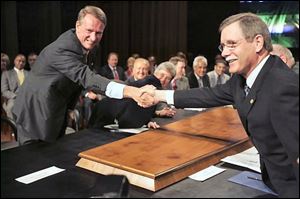
UAW picks GM as lead in auto talks; union leaders at GM plants preparing in case of strike
9/13/2007
United Auto Workers President Ron Gettelfinger, right, and General Motors Chairman and CEO Rick Wagoner shake hands to open their contract talks at the UAW/GM Center for Human Resources in Detroit, in this July 23, 2007 file photo.
DETROIT The United Auto Workers union has picked General Motors Corp. as the lead company and potential strike target in contract negotiations with the Detroit Three, a local union official said Thursday.
The official, who requested anonymity because the talks are private, said his local received notice Thursday afternoon that GM would be the lead.
Contracts between the UAW and GM, Chrysler LLC and Ford Motor Co. expire at midnight Friday.
Normally, the union negotiates an agreement with the lead company, which becomes the pattern for the other two. Contracts usually are extended beyond the deadline for companies other than the lead.
Ford spokeswoman Marcey Evans confirmed that Ford had agreed to a contract extension, but a Chrysler spokesman would not comment.
"UAW and Ford have agreed to continue bargaining past the expiration of our current contract. We're going to continue to work together," Evans said.
Contract talks have been under way for months, formally beginning in July. Until Thursday, talks appeared to be progressing, but several local union leaders at GM plants said they had been told to begin preparations in case of a strike.
Although such preparations are standard procedure in the days before the contracts expire, several local union officials said Thursday that there may have been a snag in the talks overnight Wednesday.
Workers at a Cadillac assembly and stamping complex in Lansing are readying their union hall to be the area's strike headquarters and are putting together picket signs, Chris "Tiny" Sherwood, president of UAW Local 652, said Thursday. Before Thursday, officials on both sides had reported that bargaining was progressing.
Sherwood, who has been in touch with a member of the union's national bargaining committee, said he was told the talks took a turn for the worse Wednesday night.
"Apparently from last night until this morning, everything's changed," said Sherwood. "I've never been asked to get my hall ready for a strike in the last four contracts."
Union officials at several other plants who asked not to be identified because they are not authorized to speak about the talks said they, too, were holding strike meetings and getting their membership ready in case the international union calls for a walkout.
Sherwood said his talks with union officials in Detroit give him the impression that this is more serious than usual.
"If it's window dressing, they're sure not acting like it," he said.
UAW spokesman Roger Kerson in Detroit would not comment Thursday afternoon, nor would GM spokesman Tom Wickham.
It's difficult to tell whether the strike preparation talk is just union drama before the deadline or it's actually serious strike talk, said Harley Shaiken, a professor at the University of California at Berkeley who specializes in labor issues.
"There's a fine line between theater and substance in negotiations," Shaiken said. "Given the stakes, given the complexity, given the tension, you've got a temporary derailment. It's unclear whether it's more serious than that."
David Cole, chairman of the Center for Automotive Research in Ann Arbor, said he still does not think either side has the stomach for a strike.
"I would expect some tension down near the end. At some point in any of these negotiations you get to a point where there's some tough talk. It just normally arrives a lot earlier than this," he said.
New contracts were reached with the auto companies without strikes in 1999 and 2003. There were strikes at individual GM plants during contract talks in 1996, but there hasn't been a nationwide strike during negotiations since 1976.
In 2003, the union settled with all three companies without choosing a strike target.
Sherwood said they would find out if the strike threat was real sometime Friday night.
In the meantime, local union officials were awaiting further instructions.
"Anything can happen at this point. I would be foolish not to be prepared in the event of a strike," said David Green, president of UAW Local 1714, one of two locals at a GM complex in Lordstown, Ohio. "We're all very pins-and-needles. We're anticipating anything at this point."
Read more in later editions of The Blade and toledoblade.com